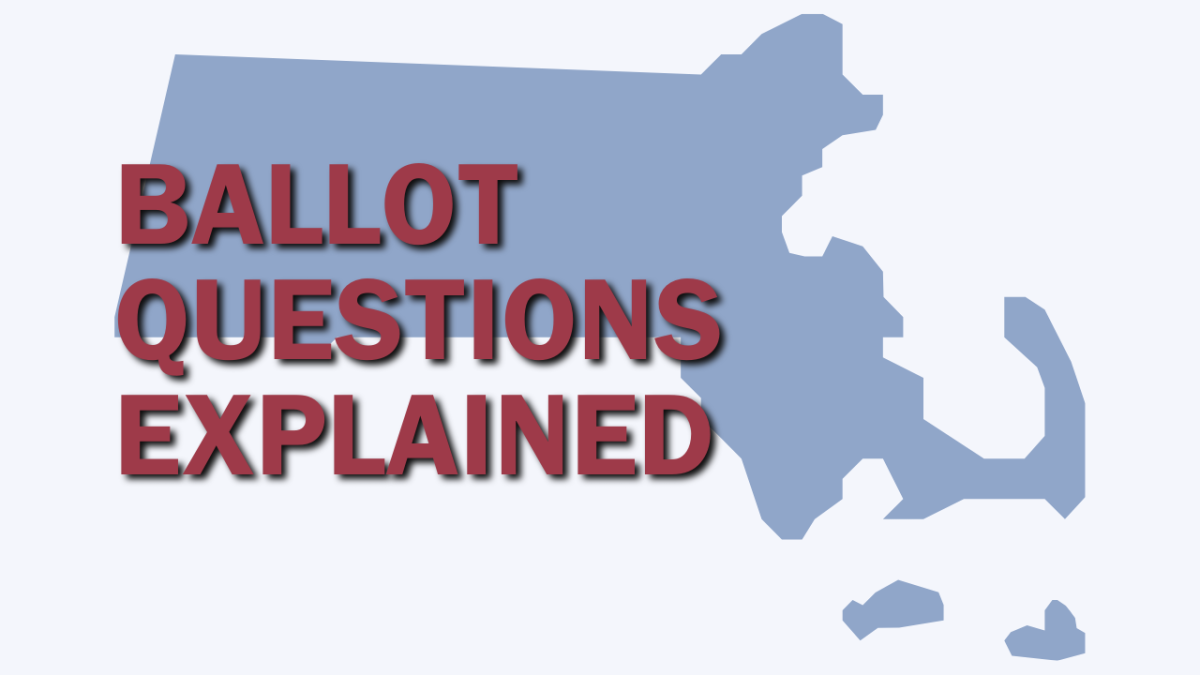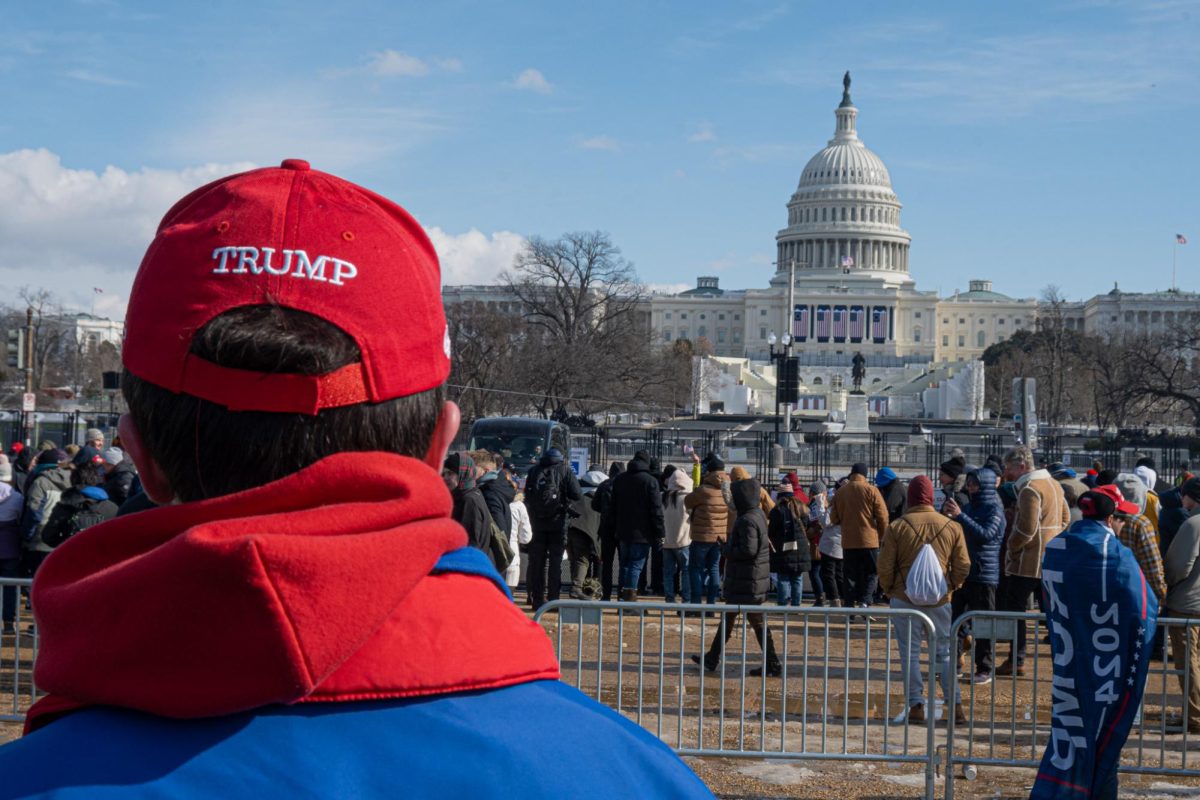Massachusetts has five different ballot questions for voters to consider in the Nov. 5 general election.
Ballot questions allow any Massachusetts resident to pose what are known as “initiative petitions” directly to voters for consideration. These petitions are first put to the legislature, only if the legislature fails to pass the proposed law does it get added to the next even year election ballot.
To provide necessary answers about the questions to voters in Massachusetts, the secretary of state sends a voter information booklet to every known address in the Commonwealth, containing the full text of the proposed laws as well as arguments in favor and against the initiatives. This booklet was used for the majority of the information in this article.
As a note adjacent to the comments the booklet says, “The Commonwealth of Massachusetts does not endorse these arguments, and does not certify the truth or accuracy of statements made in these arguments.”
The Special Joint Committee on Initiative Petitions recommended that all of the laws considered by ballot questions this year “ought not to be enacted by the legislature at this time,” according to the Secretary of the Commonwealth’s office.
The committee’s stated purpose is to consider petitions sent to the Clerk of the House of Representatives by the Secretary of the Commonwealth, according to the Legislature’s website.
Question One
Question One asks whether or not to grant the state auditor authority to audit the state legislature. The state auditor is an elected official in the Commonwealth. The current State Auditor Diana DiZoglio has spoken in favor of the ballot measure on many occasions.
In an interview with WBUR “She [DiZoglio] said the audits would examine details of state contracts and procurement practices to ensure compliance with laws and rules; review training procedures relative to sexual harassment, ethics, and cybersecurity; and bring to light any non-disclosure agreements that have resulted from illegal behavior by lawmakers.”
Jerold Duquette, a political science professor at Central Connecticut State University and co-founder of MassPoliticsProfs.org, wrote arguments against Question One that said granting new powers to the state auditor would exceed their constitutional authority.
“A legislative audit by the state auditor, who is an executive branch official, without the Legislature’s consent would violate the separation of powers and legislative supremacy described and required by the Massachusetts Constitution,” said Duqette.
Question Two
Question Two would eliminate the Massachusetts Comprehensive Assessment System as a high school graduation requirement, as well any other state or district tests that are required for students to graduate. Students would still take the MCAS exam to benchmark district performance.
Arguments in favor of Question Two say eliminating MCAS as a graduation requirement would free students and teachers from a strict curriculum that may not serve the educational needs of the students.
“Replacing the MCAS graduation requirement will allow teachers to stop teaching to a test and unburden students from a make-or-break standardized test,” said Shelly Scruggs, a parent volunteer with the Massachusetts Teachers Association.
Arguments against Question Two said that the removal of the MCAS graduation requirement would create an environment in which Massachusetts school districts could have limited requirements for graduation and limited ways to assess students’ success in each district.
“Question 2 would remove our only statewide graduation standard. Massachusetts would have less rigorous graduation requirements than Mississippi and Alabama,” said the group Protect Our Kids’ Future: Vote No on 2.
There are 17 states without a law that requires a standardized test be taken for high school graduation, including Vermont and Washington, according to the Education Commission of the States.
The question will “still require students to complete coursework that meets state requirements,” according to the Information for Voters booklet.
Question Three
Question Three would allow for the unionization of transportation network companies, or TNC, drivers. The law defines these drivers as people who drive for companies that provide a digital network to connect the drivers with passengers, like Uber and Lyft.
The law would allow drivers who meet certain eligibility requirements to form “driver organizations,” or unions, to represent them with their rideshare companies and to the state, just like other mainstream unions such as Communications Workers of America.
The question would also allow the state’s Employment Relations Board to hold hearings on unfair labor practices and allow these combines to be charged by the drivers and their driver organizations.
Drivers for apps like Uber and Lyft are not currently considered employees by these companies. The drivers are considered “independent contractors” and as such are not able to form unions under current state and federal laws governing employee relations.
Arguments in favor of Question Three say though these drivers are considered to be independent contractors, the companies treat them like employees and in Massachusetts, under state law, the companies must give the drivers benefits as though they are employees. The argument in favor says that they should be able to form a union like any other employee in Massachusetts to enter into collective bargaining agreements with the companies.
“The option to join a union is guaranteed for most workers, but rideshare drivers currently do not have that choice,” said Roxanna Rivera with the group United for Justice.
The arguments against Question Three say that because the drivers are treated better in Massachusetts than in most other places that they see no need for them to form a union and that it will hurt employees and cost them more money that they do not have.
“The law gives politicians the right to set rules with NO accountability and creates a new radical labor category that is inconsistent with federal labor law,” said the Massachusetts Fiscal Alliance.
The majority report on Question Three says “there was no testimony in opposition of the Initiative Petition,” said the Special Joint Committee on Initiative Petitions.
The report added “representatives from the TNCs clearly stated that they do not hold a position on this petition,” said the Special Joint Committee on Initiative Petitions.
Question Four
Question Four would allow for the limited legalization of some “natural psychedelic substances,” according to the State Attorney General.
The proposed law would allow people 21 and over to possess “personal use amounts” of the substances psilocybin, psilocyn, dimethyltryptamine, mescaline and ibogaine. This is in addition to whatever they might grow in their home. This law would allow for the sale of these substances by regulated and licensed establishments and the creation of a Natural Psychedelic Substances Commission.
The question would also allow people to give away up to the personal use amount of substances to a person aged 21 and over.
The arguments in favor of Question Four say legal access to psychedelics will help people with debilitating mental illnesses seek the treatment they need after other forms of treatment have failed to be effective.
“Vote YES on 4 to provide safe, regulated access to promising natural psychedelic medicines for treatment-resistant PTSD, anxiety, and depression. Psychedelic will be available in approved therapeutic settings under the supervision of trained and licensed facilitators, not sold in stores to be taken home,” said Lieutenant Sarko Gergerian, Mental Health Counselor of the group Massachusetts for Mental Health Options.
The arguments against Question Four say the legalization of psychedelics will lead to an increase in drug abuse. Many dissenters also call into question the effectiveness of psychedelics in treating mental illnesses.
“Question 4 would decriminalize psychedelics, open for-profit centers, allow for growth in a 12-foot by 12-foot area in homes, and distribution state wide. A black market is inevitable with this amount of home growth,” said Dr. Anahita Dua, a surgeon at Massachusetts General Hospital and Associate Professor of Surgery at Harvard Medical School, for the Coalition for Safe Communities.
In the majority report on Question Four, the Special Joint Committee on Initiative Petitions found that the ability of individuals to gift the substances “would likely subvert the safety regulations imposed on licensed facilitators by permitting the growth of an unregulated, unlicensed marketplace.”
Question Five
Question Five would lead to a gradual increase of the state tip wage over the course of five years to the full $15 under Massachusetts law.
In the United States, most states allow restaurant owners to pay less than the minimum wage to their employees under the assumption that through tips the employees will make up the difference to earn at least the minimum wage. If the difference is not made up, restaurant owners then must provide the difference in employee wages.
Through question five the tip wage will be increased over five years. At the end of the five year period on Jan. 1, 2029 restaurant owners will be required to pay their all employees the full $15 minimum wage at all times regardless of how much is earned through tips.
This means that employees will earn the full $15 state minimum wage, in addition to any tips earned while on shift. At the end of the five year period, employers would be permitted, but not required, to implement a tip pool and distribute tip proceeds to all non-management employees.
Under current law tipped workers “must be paid a minimum of $6.75 per hour provided that their tips bring them up to at least $15 per hour,” according to the State’s website on wage laws.
The arguments in favor of Question Five say that workers in restaurants deserve to earn a full wage from their employer regardless of the amount they might be tipped during a shift. They view it as unfair that people are reliant on patrons to make up their pay gap.
“Workers in seven other states earn a full wage plus tips, and they enjoy robust tips and growing restaurants where menu prices are comparable to Massachusetts,” said Estefania Galvis for One Fair Wage. “Tips should be a reward for good service, not a subsidy for low wages paid by large corporations.”
Arguments against Question Five said “This would reduce overall wages for servers, increase costs for restaurants and skyrocket the cost of eating out. It will be disastrous with many neighborhood restaurants being forced to close,” said Doug Bacon for the Committee to Protect Tips. Bacon also states they are a former server and bartender, current restaurant owner.
According to Ballotpedia, the group Bacon represented is funded by four large restaurant and hospitality companies from mostly outside Massachusetts. They have also received funding from the Massachusetts Restaurant Association, a lobbying group for state restaurant owners.
Darden Corp. is the second largest contributor to the Committee to Protect Tips. They are the owners of Olive Garden, Yard House, The Capital Grille, Eddie V’s, Longhorn SteakHouse and other national restaurant brands.
The Apple American Group LLC/Flynn Group is the third largest contributor. They are also the largest owners of Applebee’s franchises in the world. The Flynn Group also owns Taco Bell, Panera, Arby’s, Pizza Hut, Wendy’s and Planet Fitness locations.
The Hampshire House Corporation are the owners of Hampshire House, Cheers Boston, 75 Chestnut, and 75 on Liberty Wharf. The company has dedicated most of their websites to the ‘No on 5 campaign’, aiming to dissuade voters from voting yes on question five. They are also contributors to the campaign against Question Five.
The group has also received large contributions from Steve DiFillippo, the owner of Davio’s restaurant group. The company has restaurants located around the country in Atlanta, Back Bay, Seaport, Braintree, Logan Airport, Lynnfield, Foxborough and Philadelphia. The company also owns Avila’s restaurant in Boston.
“The committee believes the legislator would be well-served to work with the attorney general to support enhanced prevention of wage theft, sexual harassment, and assault in tip wage industries,” said the Special Joint Committee on Initiative Petitions in the majority report.





















